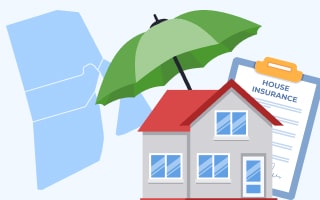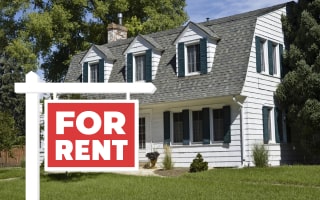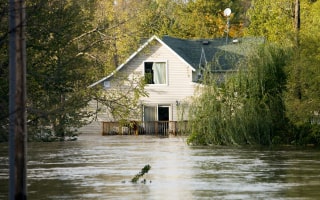Homeowners Insurance in Rhode Island

Rhode Island has miles of beautiful beaches and cliff walks near the many famous mansions. It is the smallest state in the U.S. but has plenty to offer residents, including forests, lowlands, and uplands. Located in the northeast, also known as New England, Rhode Island is prone to hurricanes, winter storms, and occasional flooding in coastal areas. Although considered a reasonably safe state, some storms can be devastating, causing property damage and claims. Since 1953, Rhode Island has had 22 federally declared disasters, and the rate of disasters per 1 million people is 20.03.
Along with winter storm damage and hurricane claims (wind/hail damage), residents of Rhode Island also file homeowners claims for other types of property damage, fires, lightning, burst water pipes and water damage, ice dam damage, vandalism, theft, and liability issues.
No state in the U.S. requires homeowners insurance. However, experts agree that everyone should have some type of coverage. Even one claim can be very costly. If you take out a mortgage to buy the home, your lender will require you to purchase home insurance and keep it active on the property until the loan is paid off.
Since September 2024, the national average for homeowners insurance has been $2,728 yearly or $227 monthly. In comparison, homeowners in Rhode Island pay $1,772, which is a thousand dollars less per year than in most states.
Types of Homeowner Insurance Coverage Available in Rhode Island
Insurance providers get to choose which states to operate in and what types of coverage make the most sense. Depending on the types of natural disasters present, they may offer more or less coverage. The available types of coverage in Rhode Island include:
-
Dwelling Coverage: Dwelling coverage protects the structure of your home and things like your roof, foundation, walls, plumbing, electrical, etc. It pays to repair or replace your home after a covered peril.
-
Other Structures Coverage: Insurance for other structures pays to replace detached items on your property, such as fences, pools, garages, sheds, and hot tubs.
-
Personal Property Coverage: Personal property coverage pays to replace your belongings if they are stolen or destroyed in a qualifying event.
-
Liability Insurance: If someone sues you after getting hurt on your property, liability insurance will pay your legal bills up to a specific limit.
-
Medical Payments: Medical payments insurance pays someone's medical bills if they are injured on your property.
-
Additional Living Expenses (ALE): If you must leave your home while it is repaired or rebuilt after a disaster, ALE insurance will pay your expenses (food, lodging, pet boarding, laundry, travel, etc.).
Rhode Island has a lot of coastline and some hurricanes, creating a potential for floods. Property owners should consider a flood policy and an umbrella policy to cover the gaps left by others.
FEMA (Federal Emergency Management Agency) manages the National Flood Insurance Program (NFIP) through a network of 50 providers across the U.S.
Since most homeowners insurance does not cover floods, this supplemental coverage can repair damage and replace items after a flood. It can cover the building and/or your personal belongings, depending on your options. This program is available to homeowners, renters, and businesses. Learn more about the program on FEMA's website.
Home Insurance and Natural Disasters
Severe weather across the U.S. is becoming the norm. These frequent natural disasters cause much property damage, resulting in costly claims for insurance providers. Global warming and climate change are the two main drivers for homeowners insurance rates today. Over the past five years, rates have spiked 34% across the country and, in some areas, even as high as 60%. In Rhode Island, home insurance rates have increased by 33.7%, almost matching the national average.
Rhode Island has only a few potential hazards, which include hurricanes, heavy winter storms, and flooding. All of these can cause severe property damage. Even one claim for water or freezing damage costs insurers an average of $11,650. A claim for fire or lightning costs an average of $77,340, and the cost for a wind/hail claim averages $11,695. From 2015 to 2019, Rhode Island insurance carriers lost a total of $208,193,600. From 1980 to 2024, Rhode Island had 33 billion-dollar disasters. In 2023, Rhode Island had only three tornadoes with zero fatalities.
How Can I Save on Homeowner Insurance Premiums in Rhode Island?
With the cost of everything rising steadily, homeowners must find creative ways to save money. The trick is knowing what factors affect the price of home insurance rates and then adjusting from there. The things that affect home insurance in Rhode Island are:
-
Location: Location is the number one factor driving insurance rates. If you live in an area prone to disastrous weather or high crime, you will pay more than somewhere safe and quiet.
-
Age of the Home: The age of your home matters quite a bit. The older the home, the more premiums you will pay.
-
Coverage Amount: The more insurance you purchase, the higher the price.
-
Size of the Home: The larger the home, the more your insurance premiums will be because it will cost more to rebuild after a disaster.
-
Condition of the Home: Homes in poor condition cost more to insure than homes in good condition.
-
Deductible: The higher your deductible, the lower your rates will be. Conversely, the lower the deductible, the higher your rates.
-
Credit History: Your credit history indicates your level of responsibility and risk. If you have poor credit, your rates will be higher than if you have a high score.
-
Claims History: If you have filed many claims in the past (even with another carrier), your rates will be much higher than if you have a clean claims history.
-
Pets: Your rates will be higher if you have certain breeds of dogs or other "perceived dangerous" pets.
Tips to save on your home insurance rates include:
- Avoid High Risks: Eliminate risky items from your home, such as hot tubs, pools, and trampolines, and you could save on your insurance.
- Bundle Your Policies: Bundle multiple policies with the same carrier, and you can save on your rates.
- Reinforce Your Home: Install a more substantial roof, windows, and storm shutters to lower your risk and save on homeowners insurance.
- Improve Your Credit: Improve your credit score and then ask your insurance agent to re-evaluate your rates.
- Raise Your Deductible: Raise your deductible as high as possible to save on your insurance rates.
- Improve Home Security: Install a high-end security system to protect your home against theft, vandalism, and fire and save money on your rates.
- Install Fire Safety: Install a sprinkler system, smoke alarms, and fire extinguishers to reduce fire risk and lower premiums.
- Don't File Small Claims: Hold off on filing small claims; wait for the big one to keep rates down.
- Ask for Discounts: Ask your insurance agent for eligible discounts.
- Shop Around: Shop around for a provider and compare rates.
Home Insurance Discounts in Rhode Island
Home insurance is financial protection for your home. It pays to repair or replace your house and related items after a qualifying event, such as a fire, smoke, windstorm, theft, or vandalism. Most policies include dwelling coverage, other structures, personal property protection, liability, medical payments, and ALE coverage. You choose your coverage limits, and your provider will pay up to them.
You can get a new policy quickly by selecting the insurance company you want to work with. Then contact them via their 800 number or online using their website. You can also find a local agent to help you decide on coverage limits and premiums based on your situation. Once you apply you will have to pay the first year in advance. Afterward, you can pay monthly through your mortgage escrow or once a year, depending on whether you financed your home or own it outright.
Some of the most common discounts offered by reputable firms include:
- Military or Vet Discounts: Many firms offer discounts for veterans or active military personnel.
- Senior Discounts: Seniors can also get discounted insurance rates for being a certain age.
- Bundling Discounts: They usually discount your rates if you bundle multiple policies with the same company.
- Loyalty Discounts: If you stay with the same firm for many years, your rates may decrease over time.
- Claims-Free Discounts: Stay claims-free for a long time and enjoy lower rates.
- Payment/Paperless Discounts: Sign up for auto payments or paperless statements, and your insurer could shave a few dollars off your premiums.
- Security/Home Safety Discounts: Install a security system or safety features like smoke alarms and sprinklers to save money on your premiums.
- New Home Discounts: Build a new home, and you will pay up to 40% less on your insurance.
- Non-smoker Discounts: If you are a non-smoker, your fire risk is lower, and so will your rates.
- New Roof Discounts: Install a new, sturdier roof that weathers storms better, and you could save money that way.
Common Rates Offer by Homeowners Insurance Firms
New homes cost a lot less to insure than older homes. In some cases, homeowners pay up to 40% less! Homes only five years old or younger cost as much as 26% less to insure. The cost of new home insurance in Rhode Island averages $1,064 a year. However, your actual rate will depend on many things like your age, credit score, claims history, etc.
Top 10 Home Insurance Firms in Rhode Island and Average New Home Savings
| Company | % savings |
|---|---|
| Nationwide | 76% |
| Amica | N/A |
| Allstate | 47% |
| Travelers | 63% |
| USAA | 54% |
| Chubb | N/A |
| Liberty Mutual | N/A |
| PURE | N/A |
| Narragansett Bay Insurance | N/A |
| Providence Mutual | N/A |
Home Insurance and Renovations in Rhode Island

Home renovations can transform your house into something exceptional but can also impact your home insurance rates quite a bit. Some upgrades add risk or value to your home, and your rates will increase because of them. Other updates make your home safer and lower your rates. Some may have no effect at all or do both and cancel each other out.
![]() Home Renovations that Increase Rates
Home Renovations that Increase Rates
Some home renovations that increase your rates include:
- Add a Home Office: Working from home intensely improves your work-life balance but will also increase your home insurance rates.
- Upgrade Kitchen or Bath: Upgrading your kitchen or bath can increase the value of your home by up to 50%, but it also increases your home insurance premiums.
- Add a Pond or Fountain: Ponds and fountains are considered "attractive nuisances" to insurance companies, which charge more for insurance when you have them.
![]() Home Renovations that Decrease Rates
Home Renovations that Decrease Rates
Some home renovations that decrease your rates include:
- Fire Safety Stuff: Installing smoke alarms, a sprinkler system, and fire extinguishers can reduce your fire risk, and your provider will cut your rates to match.
- Replace Your Roof: Install a more substantial roof made to withstand storms better, and your insurer will decrease your rates.
- Install Hurricane Shutters: Hurricane shutters help protect your windows against flying debris and wind damage. They also help decrease your insurance rates.
Typically, replacing your roof is a good idea. It will help make your home more weather-resistant and should lower your home insurance rates. However, using costly materials when replacing the roof could also increase its value.
Home insurance does not pay for upgrades and renovations unless they are performed due to a covered peril. It only pays for damage caused by a weather event, theft, vandalism, or other type of property damage. However, during renovations, home insurance covers those who get hurt or steal something.
You should always consult your insurance agent before performing any work. They can instruct you on how to proceed and counsel you on how your insurance, including your rates, may need to change.
Rhode Island Renters' Insurance

People who rent homes also need homeowners insurance. Renters insurance is specifically designed for renters but includes no dwelling coverage. The property owner should have their own policy to replace the building after a covered peril. The main goal of renters insurance is to protect your personal property. It pays to replace your items after they are stolen or destroyed by a disaster like fire, smoke, theft, vandalism, or windstorm. These policies also include liability coverage, medical payments, and loss of use.
Some of the items that renters insurance covers are:
-
Small Appliances
-
Furniture
-
Clothing
-
Bedding
-
Bath Items
-
Electronics
-
Sporting Equipment
Renters insurance is priced according to three main factors, and they are:
-
Location: Even as a renter, your location matters. If you live in the city, you will pay more than if you live in the country. If your area has many weather events, you will pay higher rates.
-
Coverage Amount: The more coverage you buy, the higher your premiums.
-
Number of Units: The more units in your building, the lower your rates.
The national average for renters insurance is between $15 and $20 monthly. Rhode Island renters pay an average of $18.23 a month, which is within that range.
Condo Insurance in Rhode Island

Rhode Island condo owners also need homeowners insurance to protect their investments. Condo insurance, or HO-6, is slightly different from homeowners insurance. Unlike renters insurance, which has no dwelling coverage, condo insurance does, but it is limited to the interior only. Every condo association has a master policy that includes dwelling coverage that protects the structure of each building. If destroyed by fire or other peril, the master policy will pay to restore it to its original condition. However, any interior upgrades that owners have made, like appliances, cabinets, countertops, flooring, and light fixtures, would not be covered under the master policy. That is where HO-6 insurance comes in and restores everything from the "walls in" back to its current condition. Another difference between homeowners and renters insurance is that condo insurance liability coverage only works if the person is hurt inside the condo, not on the common grounds.
Condo insurance also includes liability protection, personal property coverage, medical payments, medical payments, loss assessment, and loss of use coverage. In the event of damage due to storms, fire, or vandalism and theft, condo insurance will replace:
- Interior Walls
- Appliances
- Flooring
- Cabinets
- Countertops
- Light Fixtures
- Wiring
- Plumbing
- Personal Belongings
Condo owners in Rhode Island pay an average of $615 a year, or $51 a month, for condo insurance, which is very close to the national average of $625/year. That is for $60,000 in personal property coverage, $300,000 of liability and a $1,000 deductible.
You can save on condo insurance premiums by doing the following:
- Shop Around and Compare Prices
- Bundle Your Home and Auto Together
- Increase Your Deductible
- Look for Other Discounts
- Upgrade Your Home with a Security System
- Keep Your Credit Score High
- Avoid Small Claims
Rhode Island Home Insurance Market
It's not a great time to be in the homeowners insurance business. In America, frequent natural disasters lead to surging claims and devastating insurer losses. Rhode Island providers have fared pretty well over the past 11 years. They lost money only one year over the past decade, but their profits are quickly dwindling, and eventually, they will start to see continued losses. When that happens, they may have to pull out of the state, limit coverage, or cancel specific customers.
Rhode Island residents are lucky because the only natural disasters they contend with are winter storms, flooding, and occasional hurricanes. That being said, these nasty weather events are becoming more frequent and causing much damage. If it continues and providers start to leave the area, homeowners may find it challenging to find coverage.
The federal government is not in charge of regulating the home insurance industry. Therefore, each state creates its own department to monitor providers and rates, investigate customer complaints, and sanction guilty firms. In Rhode Island, that agency is the Insurance Division, located at 233 Richmond Street, Suite 233, Providence, RI 02903.
Homeowners Insurance Guide
- Homeowners Insurance in Rhode Island
- Types of Homeowner Insurance Coverage Available in Rhode Island
- Home Insurance and Natural Disasters
- How Can I Save on Homeowner Insurance Premiums in Rhode Island?
- Home Insurance Discounts in Rhode Island
- Home Insurance and Renovations in Rhode Island
- Rhode Island Renters' Insurance
- Condo Insurance in Rhode Island
- Rhode Island Home Insurance Market
Instant Access to Rhode Island Property Records
- Owner(s)
- Deed Records
- Loans & Liens
- Values
- Taxes
- Building Permits
- Purchase History
- Property Details
- And More!
Homeowners Insurance Guide
- Homeowners Insurance in Rhode Island
- Types of Homeowner Insurance Coverage Available in Rhode Island
- Home Insurance and Natural Disasters
- How Can I Save on Homeowner Insurance Premiums in Rhode Island?
- Home Insurance Discounts in Rhode Island
- Home Insurance and Renovations in Rhode Island
- Rhode Island Renters' Insurance
- Condo Insurance in Rhode Island
- Rhode Island Home Insurance Market